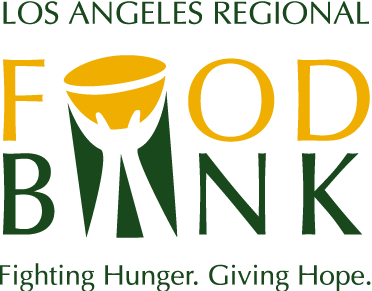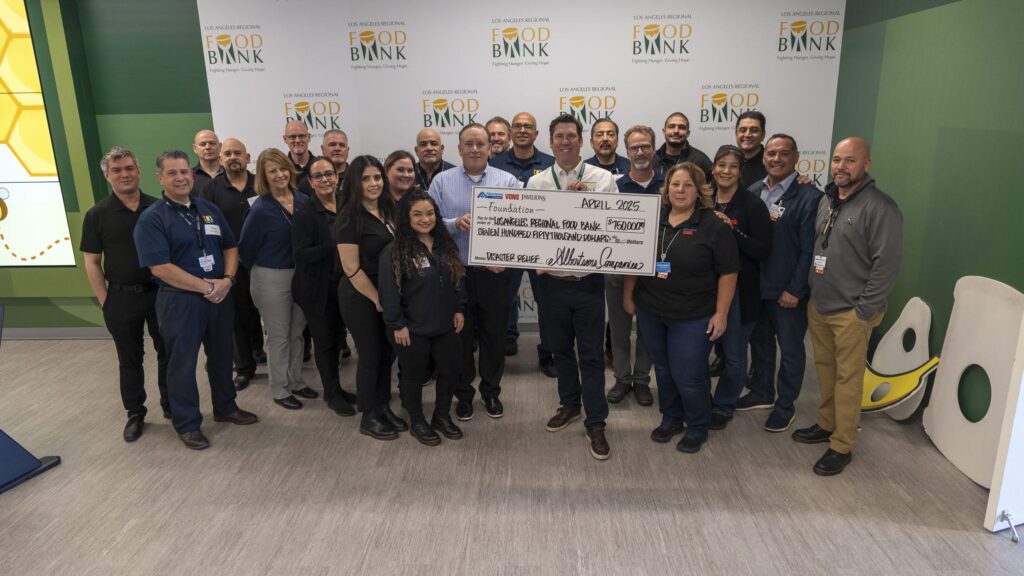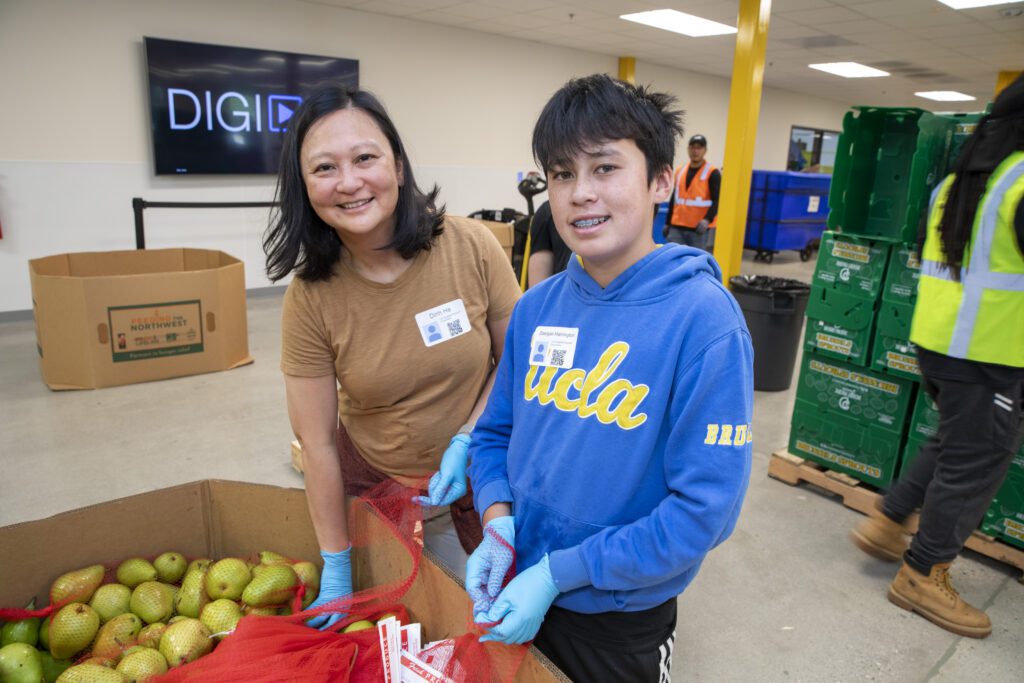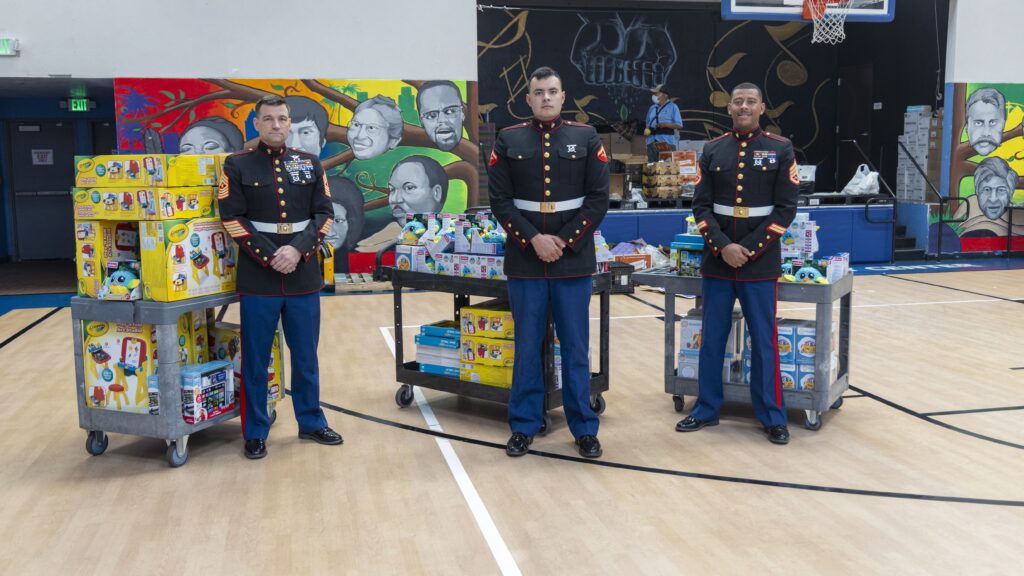How the LA Food Bank Fought Hunger in 2020: A Year in Review
How the LA Food Bank Fought Hunger in 2020: A Year in Review
Since March 2020, the Los Angeles Regional Food Bank has collaborated with a growing number of partner agencies to face the unprecedented demand for food assistance, serving more than 900,000 families and individuals each month since July 21, 2020.
With many of our neighbors facing layoffs and reduced working hours, the pandemic has led to high unemployment and poverty rates across LA County. Thanks to partners, donors, and volunteers’ generosity, the Food Bank has increased distribution by more than 145% since October 14, 2020, distributing 137 million meals to those in need from March through the end of January 2021.
Distributing Food in January and February 2020: Pre-Pandemic
During a usual month before the pandemic, the Food Bank served roughly 300,000 food-insecure children, families, seniors and individuals across LA County, operating through a network of 600 partner agencies (700, as of 2/17/2021) and direct distribution programs. Through our Mobile Food Pantry (MFP) program, for instance, we sent Food Bank trucks to parking lot distribution sites, where we provided free boxes of shelf-stable items and fresh produce to those in need. We also distributed healthy meals to about 28,500 seniors each month at 146 senior centers and other locations.
Additionally, to reach food-insecure students and their families, we provided food packages at LAUSD and Compton Unified Schools as part of our BackPack Program. We also distributed food products for families through our Children’s Breakfast Program and Mobile School Pantry and partner with youth program sites like the Boys & Girls Club to reach even more kids with our After-School Meals Program.
Amid the pandemic, this work continues.
Adjusting to Public Health Guidelines in Mid-March
Beginning the week of March 16, 2020, the Food Bank began to organize special drive-through distributions as an extension of our MFP Program, distributing nutritious food products in a social-distanced format. More specifically, the Food Bank worked with partner organizations to hold distributions at the Hospitality Training Academy in Los Angeles on March 17th and 18th, providing nutritious meals to almost 1,600 neighbors in need. We served about 70,000 pounds of food during those two days, including whole chickens, apples, and oranges. By March 27, 2020, food distribution was up 50% relative to the same week in 2019.
The quick increase in food distribution reflects Food Bank staff, partners and volunteers’ hard work, and our ability to function with few constraints as an essential service. Although our South Los Angeles and Commerce distribution centers were closed to the public, we adjusted to COVID-19 social distancing guidelines. We transitioned to drive-through distributions, which allowed us to continue serving LA County safely.
Distributing 23.5 Million Meals in Three Months
Demand for food assistance continued to rise after March, exasperated by the economic downturn: the LA County unemployment rate reached a high of over 20% in May. By June, we increased food distribution by more than 70%, helped by dedicated partners, volunteers and donors. Through more than eighty drive-through distributions, we provided 28.2 million pounds of food or 23.5 million meals to adults, kids and seniors, serving more than 500,000 clients each month — an increase of 200,000 compared to January and February. Distribution attendance ranged from between 1,000-7,560 families and individuals at each. With our partners’ help, the Food Bank distributed 472,000 emergency food boxes to roughly 1.4 million of our neighbors in need.
By June, 50 of our partner agencies had suspended their services and many more were struggling to meet the high demand. We helped narrow the gap between food donations and demand by purchasing food items in bulk at wholesale prices. To expand our reach, we also formed 41 new partnerships with agencies across LA County.
With many seniors’’ centers and schools closed, we also adjusted our regular food distribution programs for kids and older adults, who are often at increased vulnerability for food insecurity. We continued to serve more than 27,800 seniors each month at designated distribution sites and also helped augment LA County senior meals with shelf-stable food products. Additionally, recognizing that seniors are at high risk of COVID-19, we partnered with Amazon to deliver nutritious meals to their doorstep, helping them stay safer at home. For food-insecure students, we also supplemented school districts’ grab-and-go meal distributions with other food for kids and their families, particularly at the Los Angeles and Inglewood Unified School Districts and the Mountain View School District in El Monte.
- Related Story: Executive Summary: The Impact of COVID-19 on Food Insecurity in Los Angeles County
- Related Story: Executive Summary: COVID-19 Recession Effects on Food Insecurity, Housing and Employment
Assistance Continues Through Summer and Fall
Throughout the summer and fall, the Food Bank’s two distribution centers in South Los Angeles and Commerce continued to function without significant difficulties but were closed to the general public. We also began to use donated warehouse space in Commerce thanks to Prologis. During these months, drive-through distributions continued weekly to serve thousands of families with health protocols in place. These distributions ranged in attendance from 1,000 to 7,560 households served.
During August, the Food Bank’s distribution went from 80% more than the pre-pandemic norm to an 114% increase. By mid-October, as our distribution numbers continued to surge, the Food Bank was distributing 145% more food than before. Current demand remains at this amount through mid-February 2021. The Food Bank also made an effort to recruit volunteers for on-site volunteer shifts, distributions and our partner agencies across the County. On top of this, the U.S. National Guard was deployed to assist on-site, assembling food boxes for distributions. The Food Bank continued to serve food-insecure residents by purchasing truckloads of food, with the 10 million dollars in funds partitioned by Los Angeles County.
By the end of October, the Food Bank distributed 124 million pounds of food (103 million meals) since the crisis began in March, including 1.5 million individual emergency food boxes given to our neighbors in need. With this significant demand, food donations to the Food Bank increased by 120%, and by the winter, this number would reach 140%.
At this point, there were more than 120 drive-through food distributions in the communities of Alhambra, Altadena, Athens Village, Arcadia, Arleta, Azusa, Baldwin Park, Bell, Bell Gardens, Bellflower, Burbank, Carson, Castaic, Commerce, Compton, Covina, Cudahy, Downey, Duarte, East Los Angeles, El Monte, El Sereno, Florence-Graham, Glendale, Hawaiian Gardens, Hawthorne, Huntington Park, Industry, Inglewood, La Puente, Lake Los Angeles, Lake View Terrace, Lancaster, Lennox, Lincoln Heights, Littlerock, Long Beach, Los Angeles, Lynwood, Maywood, Mission Hills, Montebello, Monterey Park, North Hills, Northridge, Norwalk, Quartz Hill, Panorama City, Paramount, Pico Rivera, Pomona, San Fernando, San Pedro, South Los Angeles, South Gate, Sylmar, Torrance, Van Nuys, Wilmington and Whittier.
As Cases Surge in the County, the Food Bank Remains Committed to Serving Those in Need
During the winter, the Food Bank and our agency network continued to see high demand, even as unemployment slowly recovered from its May peak, reaching 10.7% in November, where it would stay for the rest of the year, compared to the national average of 6.7%. The number of people served in a month was consistent at around 900,000 people, three times more than an average month during the pre-pandemic period. From March to the end of the year, in collaboration with partners, the Food Bank helped facilitate more than 240 drive-through distributions ranging in attendance from 1,000 to 7,560 individuals. Between the outbreak and the end of the year, we distributed 145 million pounds of food to residents in need, which equals around 120 million meals.
Looking Back on the Year as a Whole
By the end of the year, the Food Bank distributed 174.6 million pounds of food and product, with 92% of the food rated as nutritious to our now 700 partner agencies and with Food Bank programs, worth more than an estimated $275 million dollars. This food was delivered at roughly 1,000 sites, many on a reoccurring basis, across LA County (between our Partner Agency distribution sites and our supplemental drive-thru distributions). This amount of food provided around 143 million meals to the residents who needed it most during the pandemic. The Food Bank also provided non-food items like diapers. In 2020, we gave 3,010,980 diapers to households in need.
Like many other organizations, the Food Bank witnessed unprecedented demand for food assistance due to the pandemic and its related economic downturn. The Food Bank also witnessed exceptional support from our agency network, donors, volunteers, and the community. Since the inception of the Food Bank in 1973, 1.7 billion pounds of food and grocery products, the equivalent of 1.45 billion meals, have been distributed.












